English Lexicology. Part 1. Word-Building Lecture 2.

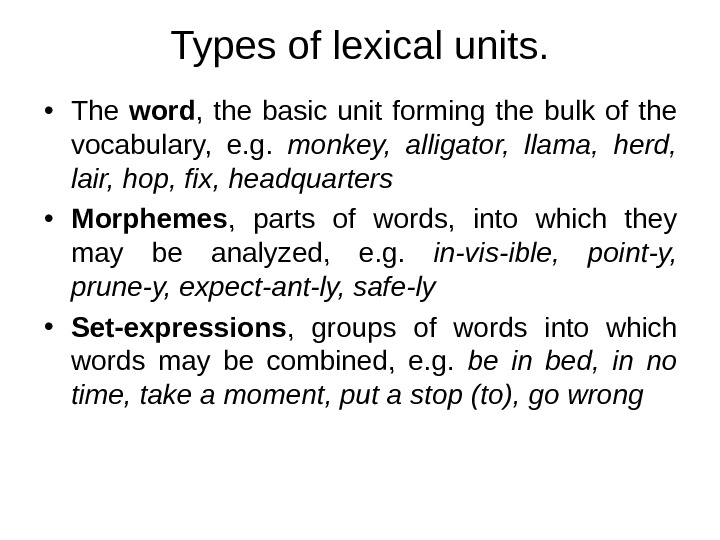


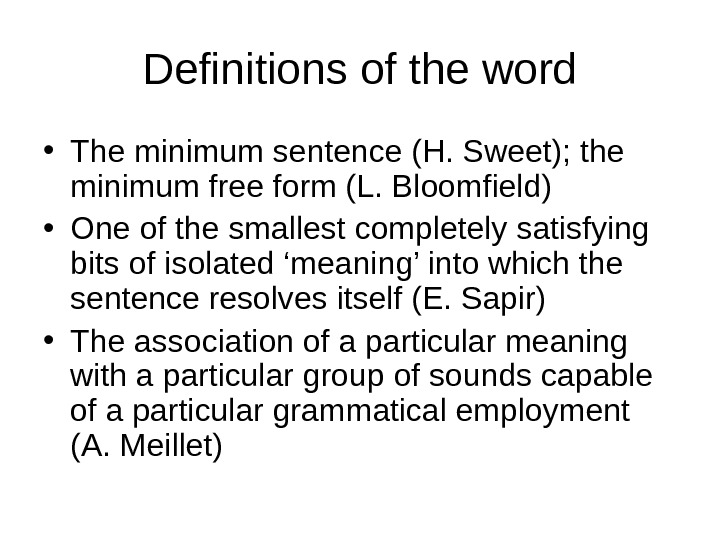
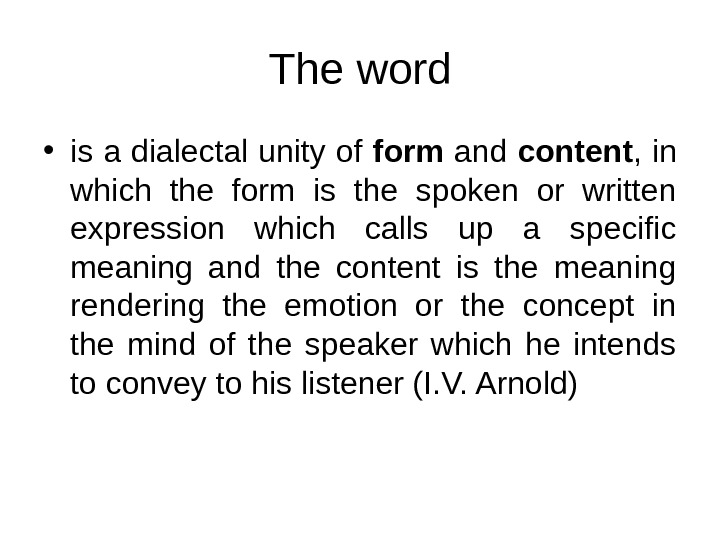
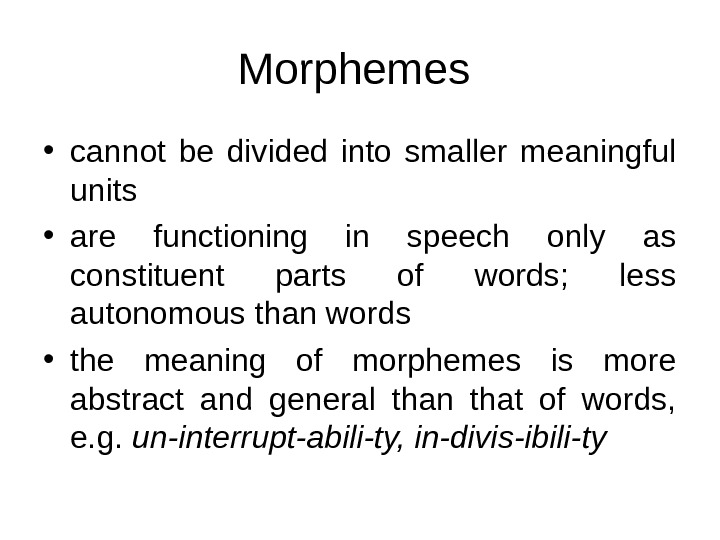

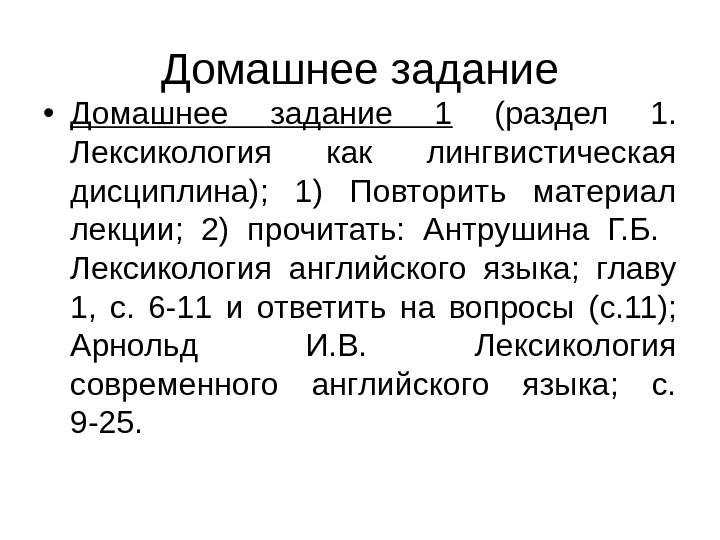
- Размер: 29.5 Кб
- Количество слайдов: 9
Описание презентации English Lexicology. Part 1. Word-Building Lecture 2. по слайдам
 English Lexicology. Part 1. Word-Building Lecture 2. Types of lexical units. Definitions of the word. Dr T. N. Bogrdanova. Elista,
English Lexicology. Part 1. Word-Building Lecture 2. Types of lexical units. Definitions of the word. Dr T. N. Bogrdanova. Elista,
 Types of lexical units. • The word , the basic unit forming the bulk of the vocabulary, e. g. monkey, alligator, llama, herd, lair, hop, fix, headquarters • Morphemes , parts of words, into which they may be analyzed, e. g. in-vis-ible, point-y, prune-y, expect-ant-ly, safe-ly • Set-expressions , groups of words into which words may be combined, e. g. be in bed, in no time, take a moment, put a stop (to), go wrong
Types of lexical units. • The word , the basic unit forming the bulk of the vocabulary, e. g. monkey, alligator, llama, herd, lair, hop, fix, headquarters • Morphemes , parts of words, into which they may be analyzed, e. g. in-vis-ible, point-y, prune-y, expect-ant-ly, safe-ly • Set-expressions , groups of words into which words may be combined, e. g. be in bed, in no time, take a moment, put a stop (to), go wrong
 Words • the central elements of language system • the biggest units of morphology and the smallest of syntax • marked off by solid spelling • represent integer concepts, feelings or actions or have a single referent
Words • the central elements of language system • the biggest units of morphology and the smallest of syntax • marked off by solid spelling • represent integer concepts, feelings or actions or have a single referent
 Distinctive features of words: • Semantic, orthographic and morphological integrity • Capacity of being used in speech in isolation • Indivisibility (cf. alive, a lion ), or uninterruptability • Positional mobility
Distinctive features of words: • Semantic, orthographic and morphological integrity • Capacity of being used in speech in isolation • Indivisibility (cf. alive, a lion ), or uninterruptability • Positional mobility
 Definitions of the word • The minimum sentence (H. Sweet); the minimum free form (L. Bloomfield) • One of the smallest completely satisfying bits of isolated ‘meaning’ into which the sentence resolves itself (E. Sapir) • The association of a particular meaning with a particular group of sounds capable of a particular grammatical employment (A. Meillet)
Definitions of the word • The minimum sentence (H. Sweet); the minimum free form (L. Bloomfield) • One of the smallest completely satisfying bits of isolated ‘meaning’ into which the sentence resolves itself (E. Sapir) • The association of a particular meaning with a particular group of sounds capable of a particular grammatical employment (A. Meillet)
 The word • is a dialectal unity of form and content , in which the form is the spoken or written expression which calls up a specific meaning and the content is the meaning rendering the emotion or the concept in the mind of the speaker which he intends to convey to his listener (I. V. Arnold)
The word • is a dialectal unity of form and content , in which the form is the spoken or written expression which calls up a specific meaning and the content is the meaning rendering the emotion or the concept in the mind of the speaker which he intends to convey to his listener (I. V. Arnold)
 Morphemes • cannot be divided into smaller meaningful units • are functioning in speech only as constituent parts of words; less autonomous than words • the meaning of morphemes is more abstract and general than that of words, e. g. un-interrupt-abili-ty, in-divis-ibili-ty
Morphemes • cannot be divided into smaller meaningful units • are functioning in speech only as constituent parts of words; less autonomous than words • the meaning of morphemes is more abstract and general than that of words, e. g. un-interrupt-abili-ty, in-divis-ibili-ty
 Set-expressions • are word-groups consisting of two or more words whose combination is integrated; they are introduced in speech ready-made; have a specialized meaning • phraseology, idioms • e. g. for love or money, up to the mark, it goes without saying, red tape, calf love, to gild the pill, meet the demand, small hours
Set-expressions • are word-groups consisting of two or more words whose combination is integrated; they are introduced in speech ready-made; have a specialized meaning • phraseology, idioms • e. g. for love or money, up to the mark, it goes without saying, red tape, calf love, to gild the pill, meet the demand, small hours
 Домашнее задание • Домашнее задание 1 (раздел 1. Лексикология как лингвистическая дисциплина); 1) Повторить материал лекции; 2) прочитать: Антрушина Г. Б. Лексикология английского языка; главу 1, с. 6 — 1 1 и ответить на вопросы (с. 11); Арнольд И. В. Лексикология современного английского языка; с. 9 -25.
Домашнее задание • Домашнее задание 1 (раздел 1. Лексикология как лингвистическая дисциплина); 1) Повторить материал лекции; 2) прочитать: Антрушина Г. Б. Лексикология английского языка; главу 1, с. 6 — 1 1 и ответить на вопросы (с. 11); Арнольд И. В. Лексикология современного английского языка; с. 9 -25.
